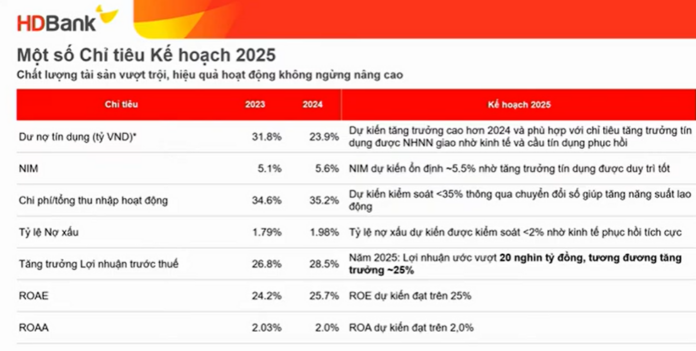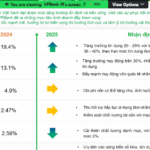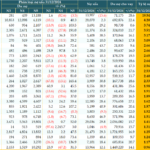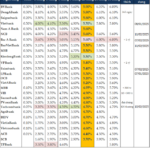The Vietnamese Banking Sector’s Promising Outlook in 2025
Vietnam’s banking industry is poised for solid growth in 2025, according to Mr. Tran Hoai Nam, Deputy General Director of HDBank. With the government’s supportive policies and an expected GDP growth rate of 7.5-8%, the stage is set for various economic sectors to thrive and outperform their 2024 performance.
However, challenges remain on the global economic front. The new policies introduced by the Trump administration regarding taxation will have a significant impact on international trade. Additionally, the Fed’s potential decision to maintain high-interest rates internationally may influence Vietnam’s interest rate environment.
While there have been positive developments in the Russia-Ukraine war, the ongoing trade war between the US and China is a dynamic that warrants close monitoring. The strengthening of the US dollar will also have ramifications for the Vietnamese currency.
Despite these challenges, 2025 offers promising prospects for economic growth, particularly in the banking sector. The industry-wide credit growth target of 15-16% is well within reach this year. The government’s commitment to maintaining low-interest rates to support businesses means that interest rates are likely to remain stable, with any fluctuations expected to be minor.
HDBank’s financial director, Mr. Pham Van Dau, shared insights into the bank’s strategic direction for 2025. Following their involvement in the restructuring of DongABank (now Vikki Bank), HDBank has received support from the State Bank of Vietnam in the form of higher credit growth targets. The bank aims to surpass its 2024 credit growth performance while tightly managing its non-performing loan ratio, targeting to keep it below 2%.
To achieve this, HDBank is focusing on the SME segment and individual customers in second-tier cities and rural areas, which offer significant potential and lower risks. The non-performing loan ratio in these areas is only 1.4%, compared to 2.1% in tier-1 cities and a national average of 1.7%. By maintaining a stable net interest margin of around 5.5% through robust credit growth, the bank is poised for success.
For 2025, HD SAISON is aiming high, with a credit growth target of 35-40% and a pre-tax profit goal of VND 1,500 billion. This ambitious plan is underpinned by the recovery of the consumer credit industry in 2024 and several positive economic indicators, including a growing workforce, declining unemployment rates, and a nearly 10% increase in average income.
As Vietnam’s banking sector navigates the opportunities and challenges of 2025, there is a strong emphasis on strategic growth, risk management, and adapting to the dynamic global economic landscape. With careful planning and a customer-centric approach, banks like HDBank and HD SAISON are well-positioned to thrive and deliver value to their customers and shareholders.
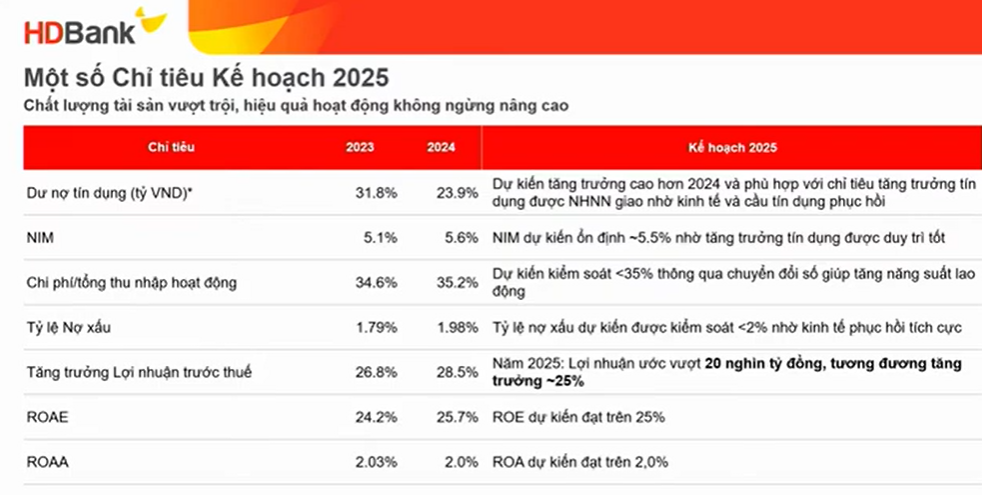
“FE Credit Embarks on a New Growth Cycle: VPBank Targets 20-25% Profit Increase by 2025”
VPBank’s representatives anticipate a 20-25% increase in the Group’s profits in 2025 compared to 2024. This optimistic forecast is attributed to a combination of favorable factors and the new growth cycle of FE Credit.
Governor of the State Bank: The Banking Sector is Ready to Support the Economy to Achieve 8% Growth and Beyond
In a volatile global economic landscape, Governor of the State Bank of Vietnam, Nguyen Thi Hong, has expressed her determination to contribute to achieving an ambitious 8% economic growth target, while also keeping inflation in check and ensuring stability in the currency market. The banking sector is projected to witness a credit growth of approximately 16%, yet it is imperative to devise synchronized strategies to mobilize and utilize capital more efficiently.
How to Prevent Bad Debt from Becoming an Economic Hindrance?
The rising tide of non-performing loans is a significant challenge for Vietnam’s banking system. It is not merely about managing bad debt but also about building a foundation for businesses to thrive and grow in an ever-changing world, ensuring that non-performing loans do not hinder the development of the financial system.



















![[IR AWARDS] June 2025 Disclosure Calendar: Mark Your Dates](https://xe.today/wp-content/uploads/2025/06/HinhT6_01-218x150.png)






